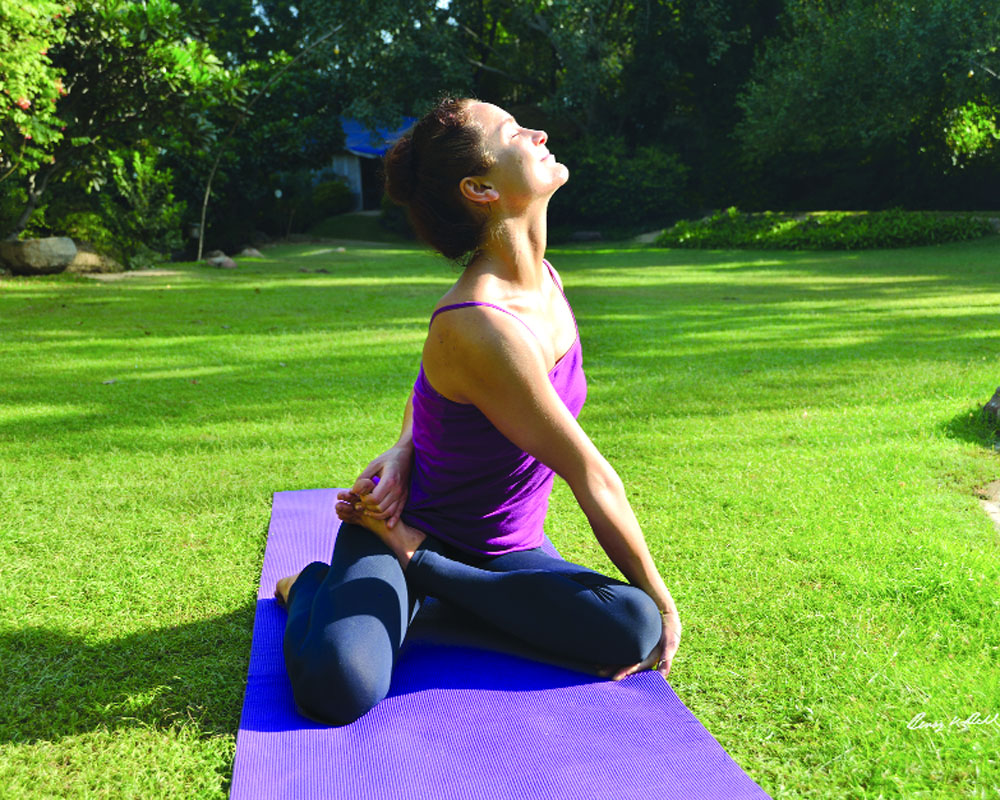Through his recent film, Yoga for Health & Global Harmony, filmmaker, art historian and photographer Benoy K Behl finds out that the purpose of yoga is to liberate us from the shackles of our innumerable desires
During this time of global health crisis and stress, Indian philosophy and yoga have become more relevant than ever. Yoga is the action part of Indian philosophy. It shows us the path, away from our fears and confusions of the world, to a century of peace, which can be found within. It points the way to love and harmony, which would be our best shields against the perils of the virus as well as of general ill-health. Our balance and peace are the foundations of our immune system. If we can preserve that, we are much stronger and less susceptible to diseases.
Yoga quite literally means to unite oneself with the higher self, which is in us and is all pervasive. It means to join the subject with the object. To do this, we have to strip away the many layers of momentary sensory perceptions, which assail our senses. These keep us forever bound to the material world. Our perceptions must be detached from the external world to look within.
We live amid much turmoil and confusion in the material world. The state of mental and physical health has deteriorated considerably. It is estimated that 70 per cent of the costs incurred on health are on chronic diseases, like diabetes, heart disease, hypertension and osteoarthritis. There are hardly any permanent solutions to these, either through medicines or surgery. Mental ailments are also expected to reach epidemic levels very soon.
I have recently completed shooting my film, Yoga for Health & Global Harmony. In an interview in the film, yoga and ayurveda expert from Santa Fe, USA, Padma Bhushan Dr David Frawley, shares, “What happened in the Western world is that we have been very good at pursuing the outer, material, media-based world. We have lost our connections to a great extent with the inner world of consciousness and direct perception. In Indian philosophy, our true state is that of sukha or eternal bliss. The purpose of yoga is to free us from our pain, to liberate us from the shackles of our innumerable desires, which lead us nowhere at all, to awaken true knowledge within us and to help us to be in harmony with all that there is.”
He elaborates further, “In the world today, we have reached a stage of tremendous fragmentation. Our language, science, is running after the particularised... We have reduced human health to very complex chemicals. The question is how do we integrate our perceptions and knowledge? How do we arrive at a holistic understanding of who we are as individuals? What is the nature of the universe? So yoga deconstructs our outer worldview of physical reality but restores our inner sense of the immortal, transcendent, overflowing universe of consciousness.”
Dr Frawley believes that yoga is about uniting our individual mind with the universal consciousness which is full of bliss. He says, “Yoga takes us to true self-awareness. While doing yoga, we calm ourselves and realise that we are less affected by the noise and distractions of the ever-changing world around us. Step-by-step, we become aware, first of our bodies and then of our breath. It lets us take the control. In that moment, the transformation begins.”
In another interview, Tulku Sherdor, director of Blazing Wisdom Institute, New York, highlights the importance of yoga. He says, “I think that all of the yogic traditions of India are all pointing to this same vision. It’s the path of reconnecting with what is most essential for our own being.”
Minakshi Devi Bhavnani, yoga guru from Puducherry, shares that love is the essence of everything. “Love transcends all personalities and as long as the personality is involved, there is no love. It has to become a universal experience. I would ask Swamiji what is love? And he would say love is profound interest... To have profound interest, you must be capable of concentration. And if we can sustain that love, it becomes dhyan. We become one with that object of love. If we can sustain that long enough, then love would take us right into samadhi, where our individual self that seeks liberation is dissolved, like the salt is dissolved in the ocean,” she says.


























